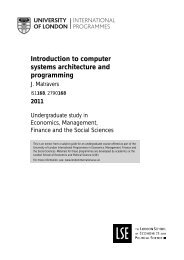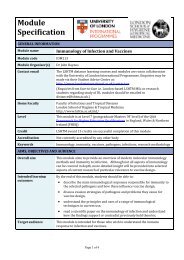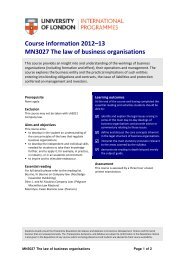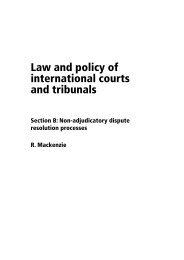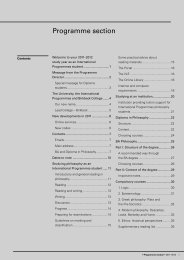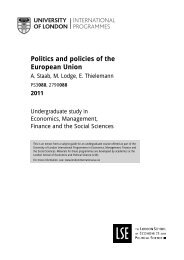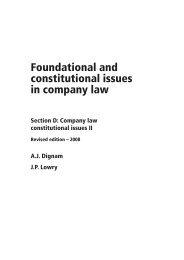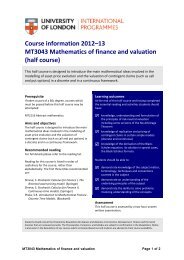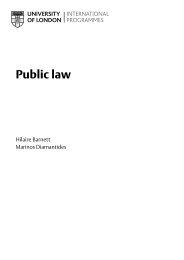Principles of sociology - University of London International ...
Principles of sociology - University of London International ...
Principles of sociology - University of London International ...
Create successful ePaper yourself
Turn your PDF publications into a flip-book with our unique Google optimized e-Paper software.
21 <strong>Principles</strong> <strong>of</strong> <strong>sociology</strong><br />
20<br />
Asking sociological questions: making the familiar strange<br />
Most people feel they have some understanding <strong>of</strong> crime and, certainly in<br />
countries like the United States and the UK that have high reported crime<br />
rates, people spend quite a lot <strong>of</strong> time talking about it. The conversations<br />
you hear are usually about how bad crime is, why it happens and, above<br />
all, what can be done to stop or at least reduce it.<br />
Sociologists are also interested in these questions and a number <strong>of</strong><br />
sociologists work in crime prevention. However, thinking as a sociologist<br />
also raises other questions. The famous US sociologist Peter Berger –<br />
whose book Invitation to <strong>sociology</strong> we have recommended as further<br />
reading for this chapter – says that part <strong>of</strong> the sociologist’s art is making<br />
the familiar become strange. This means trying to see the taken-forgranted<br />
world around you afresh, by looking at it with the eyes <strong>of</strong> a<br />
stranger, or a tourist in a foreign land.<br />
Activity 1.3 Making the familiar strange<br />
Try this yourself. If you have travelled to another country for work or a holiday, think<br />
back to the first day or two when it was new to you. Recall how much you took in;<br />
for example, how different the houses were, the streets, the people, or some <strong>of</strong> the<br />
customs, or whatever. Making the familiar strange means learning to look at your familiar<br />
environment in the same way. Select a setting that is very familiar to you, such as your<br />
place <strong>of</strong> work, college or home, and spend a little time pretending you are a visitor from<br />
another country and have never been here before. Write down what you notice. What<br />
questions spring to mind? What do you find odd, amusing, interesting about this ‘new’<br />
culture? What do you like or dislike about it? Finally, returning to your ‘real life’, is there<br />
anything you might now question or do differently as a result <strong>of</strong> ‘your visit’? But be<br />
careful here, some people may not understand that you are ‘doing’ <strong>sociology</strong>. They may<br />
feel that you are playing tricks on them and may take exception to your behaviour.<br />
From this perspective, sociologists question some <strong>of</strong> the things that most<br />
people just take for granted about crime.<br />
For example, why are some actions defined as ‘crimes’ in the first place,<br />
whereas other acts that may be equally harmful are seen as quite<br />
acceptable? Why do societies change their minds about what is and what<br />
isn’t a crime and what should be done about crime? For example, in the<br />
UK 40 years ago, it was quite legal for a man to rape his wife but illegal to<br />
be a practising homosexual. Now it is illegal for a man to rape his wife, but<br />
in many countries, including the UK, the laws relating to the prohibiting<br />
<strong>of</strong> homosexual relationships have been changed and it is not illegal to<br />
be homosexual. What this shows is that what is defined as a crime is<br />
socially defined. Sociologists are interested in how these definitions are<br />
constructed in everyday life. For example, which social groups have the<br />
power to define some acts (but not others) as crimes and some individuals<br />
(but not others) as criminals? What is considered as a crime, by the legal<br />
system, is what the law states is a crime. However laws are changed by<br />
people and laws change over time.<br />
Another difference between sociological and commonsense thinking – as<br />
we shall see in the next chapter – is that sociologists are interested in how<br />
everyday social order is maintained. From this point <strong>of</strong> view sociologists<br />
are not just interested in how crime disrupts social order, they are also<br />
interested in how crime contributes to social order. The famous French<br />
sociologist, Emile Durkheim (1858–1917), observed that it is only by<br />
identifying certain acts as crimes, and labelling certain people as criminals<br />
and punishing them, that people are made aware <strong>of</strong> the boundaries<br />
between acceptable and unacceptable behaviour. Thus, paradoxically,



